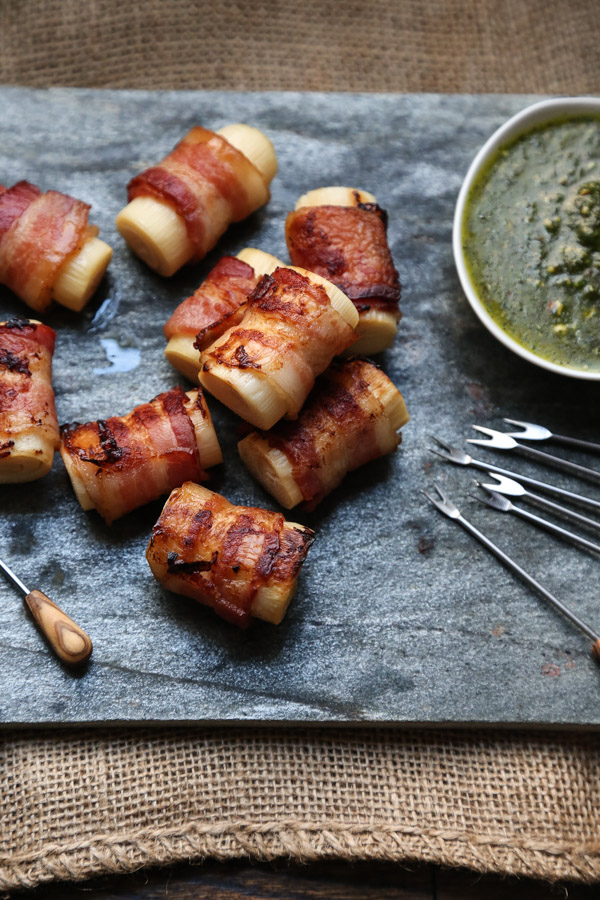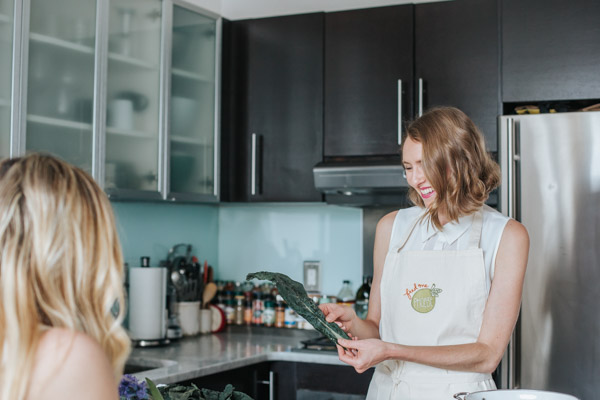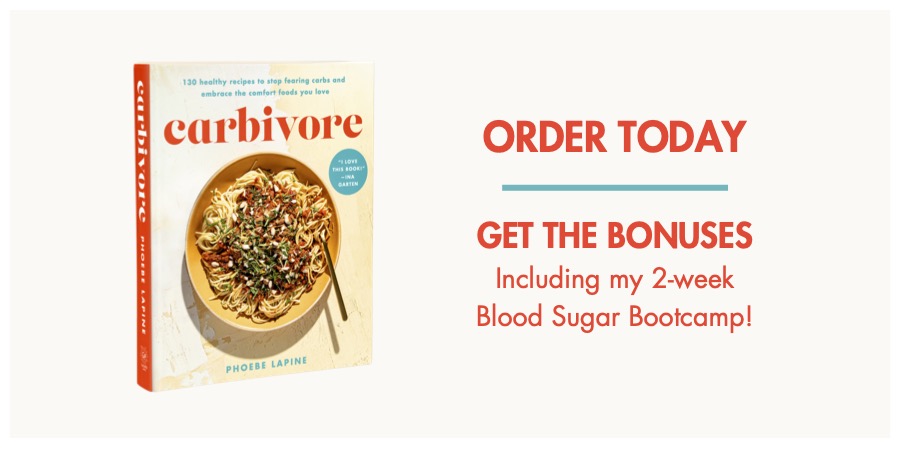A few weeks ago, I got an email from an aspiring food writer who was struggling to get her website off the ground. She asked me, flat out, is it even possible to make a full-time living as a food blogger? My response to that million dollar (er, thousand dollar?) question was yes and no.
For blockbuster bloggers, the answer is of course. A dip in search engine traffic isn’t going to break the bank when you’re Deb Perlman and getting millions of pageviews a month. For the rest of us a few tiers below though, the answer depends on your general financial situation: how expensive your city is, the number of private school educations you are currently (or plan on) paying for, how many weddings you’re attending every year, the scale of your kombucha addiction etc. etc. And, of course, who else is splitting your grocery bills…
For many of my peers, full-time blogging may be the dream. But given the direction ad revenue is moving in, and some of the crazy algorithmic ups and downs of 2016, it may not necessarily be a realistic one.
There is another approach, however. One that involves just a slight tweaking of that dream, and can potentially be just as fulfilling: odd food jobs.
Contrary to what some assume, I have never relied on blogging as my sole money maker.
If I were to share monthly income reports, as many bloggers do, you would see that only about a third of what I make in a year is directly generated from my site. The rest comes from a few other sources—all directly related to food. And it’s these other sources that I want to talk about today in hopes that those of you struggling to make ends meet with your site can see that there is more than one path forward.
There are a lot of resources out there on how to make money blogging. I’ve turned to these tips time and time again over the course of my career, and I plan on sharing where I stand on sponsored posts versus advertising versus affiliate links, along with the best practices for getting the most out of them, in my upcoming course. But I also feel strongly about a different type of strategy. One that allows you to make money outside your blog, while still doing what you love.
This strategy involves a mix of odd food jobs.
In purely financial terms, these “bridge jobs” (BJ’s) take some of the pressure off your work as a food blogger, which given the changes in 2016, is now more important than ever. And in terms of your growth as a human being, they can actually nourish your content in more ways than you may have imagined.
Though each could be the subject of a much longer user’s manual, I want to start by giving you a menu of some of the various odd food jobs. Many I’ve personally held, and some I’ve seen my fellow bloggers take on to increase their income and round out their skill sets.
First, though, let’s talk about one of the best bridge jobs around: your day job.
DON’T QUIT YOUR DAY JOB…MAYBE
The way that many people make a living while food blogging is to simply never quit their day job. Though it makes time a very precious commodity, there are many successful bloggers who have found a steady paycheck to be a much more liberating way to approach their other full time job of creating food content.
Cynthia of Two Red Bowls (winner of last year’s Saveur Blog Awards for Most Delicious Food) still puts on a pant suit every morning and goes to work as a lawyer. Even Lindsay Ostrom, reigning queen of food blogger pro-dom, didn’t take the leap of quitting her day job until Pinch of Yum was making more than her annual teaching income.
Though I still wonder if some of these folks have a special super power that gives them an extra hour in the day, I can see the merits of this approach.
The first half of 2016 has been a bit of a doozy for food bloggers.
A series of algorithm changes from the biggest traffic drivers—I’m looking at you Google and Pinterest—crippled traffic. I myself was down 40 percent in April, a nosedive that I’m just beginning to claw my way out of.
I’ve commiserated and kvetched with many bloggers about these issues, and seen that I’m not alone in feelings of frustration, disillusionment, and WTF. It’s been a disorienting year for everyone. But these changes are even more worrisome for people who rely only on their blog to pay the bills.
Advertising dollars have been steadily declining over the past few years, which puts more pressure on bloggers to rely on sponsored content. And relying on sponsored content can put pressure on bloggers to feature products that don’t necessarily fit perfectly with their ethos. Because of the above, veteran blogger Adam Roberts made the reverse career commute: after over a decade of blogging, he decided to get a day job.
TAKING THE LEAP
When I took the leap and quit my day job back in 2009, I did so in classic 22-year-old fashion: quickly and recklessly. With plenty of guts and optimism, and zero game plan for how I was going to cobble together an income. After only nine months of blogging, I had a cookbook deal that gave me a (very) small cash infusion. But more importantly, it gave me the confidence that I could find a way to get more. And I did so by taking on pretty much any food-related job that involved buttercream and not my naked body.
Making ends meet involved some unconventional and certainly unglamorous sacrifices. There was a 6-month period when I actually subletted my bedroom every weekend to help cover my rent. (A story for another time). But all in all, I’ve been making it work now for 8+ years as a part-time blogger, full-time food babe of many trades.
Relying on a constantly shifting assortment of odd food jobs is not necessarily the easy road. It takes a lot of hustle, compartmentalization and Google docs. But this strategy has given me a lot more freedom with my blog, effectively allowing me to completely start over with a new site (this one!) in 2012, and not stress out as much when the ebb and flow of the internet takes a dump on my analytics dashboard.
So let’s talk about what some of these opportunities to make money outside your blog are.
ODD FOOD JOBS: A MENU
Private Chef-ing
Early on in my blog career, I started getting emails from people based in NYC asking if I catered dinners and parties. This initial interest allowed me to get over the fact that I had zero professional training, and once I began taking on gigs, it was a great way to hone my cooking skills on someone else’s dime. Despite preparing hors d’oeuvres for hundreds of people out of my tiny studio apartment, it took me many years to call myself anything more than a “professional home cook.” But as a salty friend of my parents once told me, “if someone is paying you to cook for them, then you’re a chef. Get over it.” Amen!
Private chef-ing can take on many forms, but the best money is in catering large cocktail parties. Nothing stretches your grocery costs further than finger food. But cooking on this scale is often a challenge for those of us with small kitchens and no car. Also, the more cooking you’re doing in your own space, the more liability shifts on your shoulders. If you’re looking to do this type of cooking, make sure you get some form of liability insurance (finding a shared commercial kitchen space is not attainable for most).
You’ll also need to invest in some food service materials—storage containers, serving platters, and squeeze bottles—open an account with a rental company, and develop relationships with trusted servers who will be handling front of the house.
The easier place to get your foot in the door, and the more sustainable ongoing type of private chef-ing is to make meals for a family on a regular basis. There are many full-time opportunities to be had in this department. But the best scenario for a part-time food blogger is to limit your commitment to one or two afternoons a week. During this time, you’ll make a slew of meals that will keep well for the week ahead, and your clients can reheat at their leisure. This frees up your evenings. All of the cooking is done at their residence. You can charge a day rate for your time (on top of groceries). And you don’t have to worry about all the changing minutiae that goes into one-off events.
My short-lived catering career gave me the opportunity to cook for many esteemed folks, including Lou Reed and Danny Meyer. It also provided many hilarious and cringe-worthy stories for this site, many of which I have yet tell. But a few years ago, after my back had gone out one too many times, and I got fed up with working nights and weekends, I stopped catering big parties and pared my professional cooking down to one family, one day a week.
Having this steady income was a huge relief. It was a great way to add structure to my schedule. And it also gave me some creative time to try new techniques and experiment with recipes from other cookbook authors without the pressure of photographing and writing about them.
If you’re looking for a place to get your foot in the door, online concierge services like Kitchen Surfing are good places to get one-off jobs. But the best strategy is to simply create a page on your website for private chef services and attempt to optimize it for your city. If you search private chef NYC, you’ll easily find me. This is how I’ve gotten most of my clients—not through the blog!
[p.s. If you’re in the NYC area and want some referrals, let me know!]
Teaching
Teaching cooking classes is a totally under-explored odd food job in our niche. I think this in part has to do with bloggers not feeling confident enough that they have real hard skills to teach. But what I’ve learned both from blogging for 8 years, and from teaching cooking classes for 4 of those, is that most people (like, potentially, yourself!) could benefit from more kitchen confidence.
Even students I’ve taught who fancy themselves very experienced cooks end up learning at least a few things over the course of a class. Cooking is an endless reservoir of newness and knowledge. I don’t think I’ll ever see a day when I can’t learn something from others in the kitchen.
So, how does one begin teaching cooking classes? If you have a specific expertise (i.e. gluten-free cakes, Lebanese comfort food, baking for two), then you can begin by reaching out to cooking schools in your area to teach a few one-off classes. In New York City, I’ve taught regular gluten-free cooking classes at ICE and Haven’s Kitchen. And there’s, of course, my upcoming Food Blog Program with the Natural Gourmet Institute!
I personally think it’s less intimidating to get some practice in home kitchens like your own before you go the professional school route. Email your family and friends to let them know you’re offering up your services. Be willing to do a few classes for the cost of ingredients in return for them spreading the word.
Pamela Saltzman’s teaching business in LA began with just her monthly women’s group. But she discovered among her friends that there was a huge need for someone to teach fellow moms how to prepare healthy food for their families. Now she does big group classes, around the city and in her home, 4 days a week.
If you’re serious about building this prong of your business, create a webpage for your teaching services and optimize it. This is the same strategy as for private chef-ing, but there are fewer people offering private cooking classes (less competition!).
Figure out your target, like Pamela did. I get a lot of young couples, and therefore, have begun offering gift certificates as wedding gifts. I also added language to my site that I’m available for bachelorette parties! (No penis cakes though, sorry).
Depending on where you live, you can also partner with sites like If Only and Course Horse to offer your classes.
E-courses
Live in the boonies where there’s no one to market your services to? No worries! There’s something called the internet, which you may be intimately familiar with. Platforms like Craftsy and SkillShare are always looking for great-quality instructors to develop e-courses.
You can, of course, develop a course to market on your own site. This is an especially great option for health coaches. (Sherrie has her 21 Days to Lean + Green course that kicks off every January.)
These don’t necessarily need to be high tech or involve video. An email program with a private facebook group works incredibly well and involves no overhead on your part. If though, you are worried about your ability to sell the program to just your audience, partner with a larger site.
I did my e-course How to Cook Healthy Meals on a Budget and in a Time Crunch with Mind Body Green!
Food Styling
Yes, believe it or not, if you take gorgeous well-styled photos on your website, you could very well do it professionally for other outlets. Food and prop stylists are real full-time professions. If this is the part of food blogging you love, reach out to the people doing it for a living and assist them. At the very least, you’ll learn a lot in the process. You can find mentors by scouring cookbooks and food magazines. Stylists are usually credited on the same page as the photographer.
And speaking of which, develop a relationship with a photographer! Professional food shoots are a team effort that require a lot of hands on deck. Begin working consistently with a few photographers and you may soon become a regular part of the team.
Photography
A well-shot food blog is a living breathing portfolio of your work. But since food photography is a more competitive, crowded space than styling, you’ll need to build up your professional resume. Offer your services to local restaurants or venues. Create a simple static website of your best work that you can send to prospective clients.
Many food bloggers have transitioned to shooting professionally. Just pick up a copy of Modern Potluck to see Yossy Arefi’s work on the page. Her portfolio is housed here, separately from her blog. Nicole Franzen is another great success story of someone who’s transitioned from blogger to photographer. She just shot her fourth cookbook, Jessica Murnane’s One Part Plant!
Recipe testing
If your passion lies less on the visual side of things, there’s also plenty of work to be had as a professional recipe tester. Many publishers now require that cookbook authors hire a professional to test their recipes, versus crowd sourcing from friends and family. Adelaide Mueller, who tested my first cookbook, began simply by reaching out to chefs and bloggers when she saw that their book deals were announced. That lead her to work with Jim Lahey and many others!
Testing isn’t credited inside the book jacket, and the pay may be minimal. But it’s a great option to keep busy, keep learning, and have some money coming in at the same time. It’s also something that can be done from home, so a good option for moms.
Since there’s no visual element, you don’t necessarily need to create a professional presence online. Just do your homework, follow publisher’s weekly for new book announcements, and put yourself out there.
Recipe development + Freelance Writing
Writing, as a profession, is not the cash calf it used to be. Even Amanda Hesser wrote back in 2012 that you better be willing to take on a lot of odd food jobs if you want to try to make it as a food writer. But dare to dream!
When I have an article idea that reaches beyond the realm of my site, or would be a great fit for another outlet (and I have the time), I pitch it. That led to this feature in Cosmopolitan. A little casual stalking of Kristin Donnelly when she was at Food & Wine (she’s now a freelance writer!), led to a recipe development project for the website. And then, much to my excitement, they decided to include a few of them in the magazine itself.
Lifestyle magazines that are doing recipe spreads may not have the stable of developers that food magazines do. Try pitching them on an interesting collection of dishes! I was lucky that this Self opportunity landed in my Inbox. The editor was looking for a gluten-free chef to develop a spread for an upcoming issue. She found me not through my blog, but through my private chef services page! I imagine many full-time bloggers would have killed for that opportunity. But this is just one of many examples when my willingness to take on odd food jobs fed all aspects of my career.
Book Writing
Anyone who’s written a book knows that if you amortized the advance across the hours that go into it, we would all be making below minimum wage. I could write a very long post on blog-to-book advice for bloggers (let me know if you want one!). But it boils down to love of the process. If you just want the prestige of being published, wait until you have a massive following, in which case you might not need to write a book as an odd food job!
My first cookbook barely paid my rent for a few months, but it was the catalyst to many more opportunities in the food world, and many more odd food jobs. My second book, The Wellness Project (you can preorder here!), was an idea that, at the time, fell outside the purview of my blog. I was embarking on the experience, and I knew I wanted the challenge of telling the story in a bigger way.
I spent a year working on the proposal and laying the bricks. Then, I was lucky to land a deal. The advance was enough that I could scale back some of my odd food jobs (mainly chef-ing), but not enough that I could focus on it full-time. This came at a cost to the blog, since writing the book took over as my primary commitment.
If you want to write a book, the first step is to write a proposal and begin reaching out to agents. If you want to self-publish, then that’s really a full-time job! But there have been many success stories, including Anna Watson Carl of The Yellow Table.
Pop-Ups
If you want to try your hand at catering, but do it on your own terms, pop-ups could be a great option for you. These are one-off events, sometimes in the cook’s own home, where you get to play host/restauranteur/chef for an evening. Sherrie started doing these in St. Louis and at least from the looks of it, has been having a ball!
There are several sites for events like this in your city. Feastly is one. WithLocals is another, which also allows you to offer food tours!
Retreats
One option is to collaborate with other creatives and offer your services in one of the above fields for an exclusive weekend experience. Local Milk pioneered the retreat model for food photography and styling. You’ll see many other roving photographers designing similarly magical experiences now in faraway bespoke locations. If you live in one of these locations, host one of your own! My friend Skye McAlpine has collaborated with Beth in her Venice studio. Amie Valpone does the occasional healthy living retreat. And Jodi Moreno is even leading the food element of an upcoming retreat in NYC!
***
There are so many other bridge jobs that I didn’t mention, including teaching yoga, waiting tables, managing a small brand’s social media, or being an assistant for someone who’s already achieved the career you’re after. There’s no shame in any of these.
Of course, the downside of taking on odd food jobs is that you won’t have as much time to put into growing your site. This has certainly been a struggle for me in the last year as I threw myself into book writing. But I can’t say that pushing out 10 more Facebook posts a week would have left me feeling more fulfilled than the side work I was doing. And my blog traffic feels like a small price to pay for that.
If blogging full time is your dream, then it may be worth the upfront sweat equity of working day in and day out to build a community around your work on the web. But you should just know that these other options do exist, and they’re yours for the taking.
If you make delicious food on your site, chances are someone will pay you to make those meals for them, regardless of your lack of formal training. If you’re teaching valuable skills and dropping knowledge via your blog, someone is going to want to learn those same things IRL. And if you’re already taking stunning well-styled photos, well there are whole offline careers dedicated to doing just that.
I sincerely hope that this list helps you on your way to making a career out of your passion for food, online or off.
For those in NYC, I’ll be talking more about these bridge jobs, and many many other tips for becoming a full-time badass food babe, in my upcoming course at NGI this September. There are still a few spots left, if you want to grab one! The lovely and talented Anna Watson Carl will be joining me for this last session on making a living in the food space. Other guest speakers include Serena Wolf, Jodi Moreno, and Miranda Hammer!
Keep calm and hustle on friends,
xoxox
P
p.s. If you know someone who could benefit from more info on odd food jobs, please SHARE IT!
p.p.s. If there’s one of these jobs you’d like me to offer more advice and resources on, let me know in the comments section!









I pre-ordered your book and I’m signing up for your course, for the content but mainly for the chance to meet you after following your blog(s) for 5 years!
Well-written and generous post, Phoebe. I’m sure this will be valuable advice to many! xx
ah, pamela! you are one of my favorite food babe renegades! thank you for all the odd food job advice you’ve given me! xox
OMG I also wonder if many of these bloggers (you included) have super powers. It is hard to be in it for numbers and the money. Luckily I have my husband’s income and I just supplement with my blog money but still! It’s hard! I love everything you said here!!! It is hard to remember that we have certain skills to offer.
lady, I am in awe of all my blogger peeps who are doing all of this on top of nurturing tiny humans!! don’t be hard on yourself. I can’t imagine how much time those cute kiddos must take out of your day. it’s nice to hear the post resonated with you. I don’t want to be negative about the state of blogging – I’m sure your family appreciates the supplemental income! – but thought it was important to be transparent about the fact that after 8 years, I still prefer to use it as just one piece of the gluten-free pie 🙂 Heart you Stefanie!
Great article. Wondered if leading food tours of local or foreign cuisines was another option for making money as a food writer?
I think, for sure! It’s something I haven’t explored much, but I know that there are people who do it. Something to play around with on the site “withlocals.com” Have you ever done one in LA?
So beautiful Phoebe! Thank you for including me. Xxoo best of luck with your teaching! Your course sounds wonderful!
Love you Ames! Thanks for paving the way on the odd food job front. You’re more inspiring than you know!
Loved reading this, Phoebe! I myself have various pieces that I use to supplement my blog income, which is earned solely through sponsored content. For me it includes photography, freelance writing, and hosting on AirBnB. (And I use said Airbnb guests as recipe testers so it’s still kind of food related 😉 Anyway, I appreciate all the valuable advice you’re offering here and the transparency with which you deliver it. It’s inspiring to hear all you’ve done to make a career in food outside of blogging! 🙂 xx
DYING to hear more about this AirBNB recipe tester business!! And also super bummed I didn’t know about it when I was in Portland a few weeks ago. Would have been so great to meet you and cook together 🙂 But I am officially obsessed with your city, so hopefully we can make that happen sometime soon.
Ahh you were in portland?! I’m so sad I missed you. (Though I was pretty sick that weekend so probably for the best, LOL.) We’re getting ready to leave for a while to do some long-term travel but if you come when we get back, please let me know! We’ll cook together and make all of the airbnb guests taste test our food 😉 xoxox
I’m pretty obsessed with your town, so hopefully will be back soon. In the meantime, if your travels take you to NYC, let me know! xoxo
This is awesome and super helpful, Phoebe. Beginning to teach and do cooking demos this past year has also been useful for me 🙂
yay! I’m so glad you’re stretching your wings. Can’t wait to co-teach with you in a few weeks!
What a valuable post/resource! A great round up for anyone looking to embrace the hustle and make it work!
thanks for reading sally!! i’ve been meaning to write a dedicated post about the blog-to-book deal. when that happens, will have to do a mini interview with you 🙂 xoxox
Thanks so much for this valuable information! I’ve been at my blog for over 2 years, and making next to nothing. Fortunately, my husband is an academic dean, and is hugely supportive of my self-employed unemployment. I really feel like the time has come to start making a financial contribution again, and you have provided some great ideas!
Ah Tamara. I’ve definitely been in the self-employed unemployment weeds before! Stay strong and I really do hope that this list helps. Your site looks great, and I can definitely tell you’re putting in a lot of work. If you still love building it, I have faith that the people and $$ will come. But always good to have other irons in the fire, in my eyes. xoxo
Thanks for writing this post. I have a food blog (onehotoven.com) I work full time and blog at nights and weekends. However, after three years I still have yet to make any money, kind of frustrating. At this point I am just going to have fun on the blog and not worry about pageview, trying to get ads, etc.
That’s definitely the right attitude I think. It’s where I’m trying to get back to this year! And the bridge jobs definitely allow for that freedom. Wishing you the best of luck with it nonetheless. If you’re loving the process, nothing else matters. xoxo
Hi Phoebe! Thanks for all the food for thought. I have been interested in offering cooking lessons out of my apartment and was wondering what insight you have RE liability….even legality….of hosting classes for kids.
I would get liability insurance for sure. Since I host out of other people’s kitchens I have less at stake. But when I catered/ private cheffed for big groups I had it.